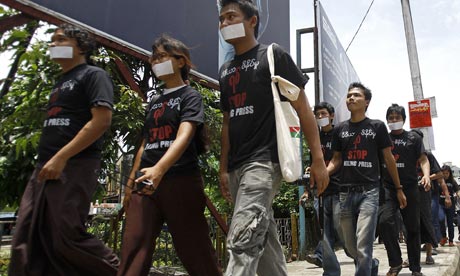One Small Step for Burmese Journalists, One Giant Step for Burma?

It's hard to overstate the relationship between a free, fair press and an open, democratic society. And in Myanmar, long known for having one of the most repressive and censorious regimes in the world when it comes to free expression, there's a small ray of hope this week for journalists and democracy activists alike - not to mention Burmese citizens. This week the Burmese government lifted substantial press restrictions by eliminating the requirement that journalists submit articles to the Press Scrutiny and Registration Department prior to publication. This announcement is the latest development in efforts to expand freedom of expression and political rights in the country: revocation of earlier suspensions for two weekly magazines was successful following protests two weeks ago, and this morning, the National League for Democracy (NLD) was able to open a party office in Naypyitaw. This illustrates significant improvements for previously persecuted opposition parties to operate within Burma. In fact, Reporters without Borders have stated that if such improvements in allowing free speech continue, that Burma would be removed from its “Internet Enemies” list.
Despite these developments, significant obstacles remain. Notable examples of this include the Computer Science Development Law, subjecting users found in possession of telecommunications equipment not sanctioned by the government to up to 15 years in prison, while the Electronic Transactions Law allows any individual found to have sent or received any information pertaining to “state security, law and order, community peace and tranquility, national solidarity, the national economy, or national culture” to be prosecuted and sentenced to 7 to 15 years in prison per incident. Exiled media groups continue to be subjected to DDoS and targeted hacking of their platforms.
Still, it's hard not to be impressed by how much has happened in such a short period of time. In 2010, NDI worked with the Burma Partnership to create the Burma Election Tracker, a resource that provided reports, data, and analysis of the election collected by dozens of local human rights, media, and advocacy organizations for the presidential election. While the 2010 election had significant electoral violations, parliamentary elections earlier this year resulted in several gains for opposition parties, indicating significant improvements in the electoral process. Over time, Burmese citizen have not only gained the freedom to speak out, but also to see their protests have a real, discernible effect.
We'll be following these developments, and their implications on democratic governance, as they progress. In the interim, please stay informed of NDI’s work in Burma by visiting our website, and we’d love to hear your comments.
